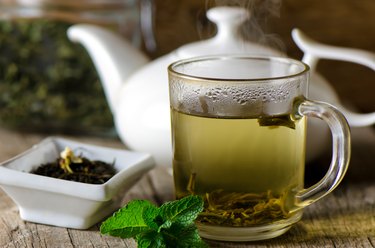
Caffeine, thought to be the world's most frequently consumed stimulant drug according to 2015 research in Current Neuropharmacology, occurs naturally in some foods and beverages like coffee, tea and chocolate.
While green tea and coffee both contain caffeine, coffee has a significantly greater amount per cup. Coffee and green tea contain other nutrients that have been linked with significant health benefits.
Video of the Day
Video of the Day
However, with any caffeinated beverage, there may be health risks. Certain populations should reduce or avoid caffeine for health reasons, so decaffeinated tea or coffee may be the best option.
Read more: How Many Cups of Coffee Can You Drink a Day?
The Effects of Caffeine
Caffeine has been consumed for hundreds of years and studies have gone back and forth on the level of safety of caffeine.
Due to its effects on the central nervous system, caffeine is classified as a stimulant and is most commonly used to increase alertness, concentration, and athletic performance, according to 2015 research in Advances in Nutrition.
Caffeine is also a diuretic and can lead to increased urination and possibly dehydration. Caffeine can also be isolated and is used in medications for headaches, appetite, pain relief and asthma.
How Much Caffeine Is in Green Tea?
Yes, green tea does have caffeine! But if you drink a cup every day, you are receiving a relatively small dose of caffeine. Eight ounces of green tea contain about 25 milligrams of caffeine, which is about half the amount of caffeine found in black tea, according to the Mayo Clinic.
However, this is still more significant than decaffeinated tea, which has between 2 to 5 milligrams of caffeine per cup. Exercise caution when drinking iced green tea or green tea lattes, as they can be loaded down with added sugar — aka extra calories.
How Much Caffeine Is in Coffee?
The average cup — 8 ounces — of coffee has about 95 to 165 milligrams of caffeine, according to the Mayo Clinic. That's the same as more than three cups of green tea. For reference, it's probably best to limit yourself to a maximum of 400 milligrams of caffeine total per day.
Drinking a cup of decaffeinated coffee provides you with about 2 to 5 milligrams of caffeine. Interestingly, a one-ounce shot of espresso has only about 47 to 64 milligrams of caffeine, so a 16-ounce latte has about the same amount of caffeine as 8 ounces of coffee (but well over 200 calories from added milk and sugar).
Comparing Coffee and Tea to Other Caffeine Sources
In general, coffee may have more caffeine per 8-ounce cup than a standard 12-ounce can of regular cola — which has around 21 milligrams of caffeine, according to the USDA — depending on how the coffee was brewed. Green tea, on the other hand, has less caffeine than coffee or soda. Coffee and tea can provide you with additional naturally occurring nutrients while most sodas and energy drinks only have added sugars and artificially added vitamins.
In addition to a boost of energy, coffee has been linked to a number of health benefits. Moderate coffee consumption has been shown to potentially reduce risk of type 2 diabetes, uterine and liver cancer and gout, according to Harvard Health Publishing, as well as death due to cardiovascular disease, according to a 2015 study in Circulation.
The polyphenols, flavonoids and antioxidants naturally found in green tea minimize inflammation and may reduce plaque buildup inside your arteries, according to Harvard Health Publishing. For the flavonoid benefits, consuming tea directly is more effective than supplementation.
Potential Side Effects of Caffeine
Drinking a couple of cups of coffee each day is generally considered safe. However, consuming large amounts of caffeine each day can lead to symptoms including restlessness, irritation, disturbed sleep cycles and abnormal heart rhythms.
If you're sensitive to caffeine, pregnant or nursing you may want to consider limiting your caffeine intake. High caffeine consumption during pregnancy has been linked to preterm birth and low birth weight, according to 2017 research in the BMJ. In addition, caffeine has been shown to interact with some medications, so speak to your physician about any significant changes in caffeine intake.
Correction: An earlier version of this story incorrectly described the amount of caffeine in 12 ounces of cola.
- Current Neuropharmacology: "Caffeine: Cognitive and Physical Performance Enhancer or Psychoactive Drug?"
- Mayo Clinic: "Caffeine content for coffee, tea, soda and more"
- Mayo Clinic: "Can energy drinks really boost a person's energy?"
- USDA: "Beverages, carbonated, cola, fast-food cola"
- Circulation: "Association of Coffee Consumption With Total and Cause-Specific Mortality in 3 Large Prospective Cohorts"
- Harvard Health Publishing: "The latest scoop on the health benefits of coffee"
- Harvard Health Publishing: "Flavonoids: The secret to health benefits of drinking black and green tea?"
- The BMJ: "Coffee consumption and health: umbrella review of meta-analyses of multiple health outcomes"
- Advances in Nutrition: "Caffeine Intake from Food and Beverage Sources and Trends among Children and Adolescents in the United States: Review of National Quantitative Studies from 1999 to 2011"